新概念3精品课件Lesson1
新概念英语第三册 Lesson 1 教学完整ppt课件
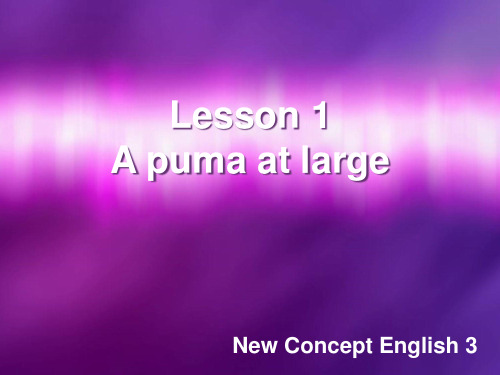
New Concept English 3
New words and expressions
puma spot evidence accumulate oblige hunt blackberry
n. 美洲狮 v. 看出,发现 n. 证据 v. 积累,积聚 v. 使……感到必须 n. 追猎;寻找 n. 黑莓
New Concept English 3
New words and expressions
oblige
v.使…感到必须
※ feel obliged to do sth 感觉有必要 做某事 -- I feel obliged to say no to his demand(n.要求, 需要) ※ be obliged to do sth 被迫做某事 -- They were obliged to sell their car to pay their debts off.(debt n.债务)
New Concept English 3
New words and expressions
evidence
n.证据(U)
※ Evident adj.明显的, 显然的 ※ Evidently adv.明显地, 显然 ※ Evidence = proof (n.证据) -- When the police arrived, he had already destroyed the evidence. ※ in evidence 显而易见的 -- He was in evidence at the party.
New Concept English 3
New words and expressions
新概念英语第三册Lesson1_3重点句型解析
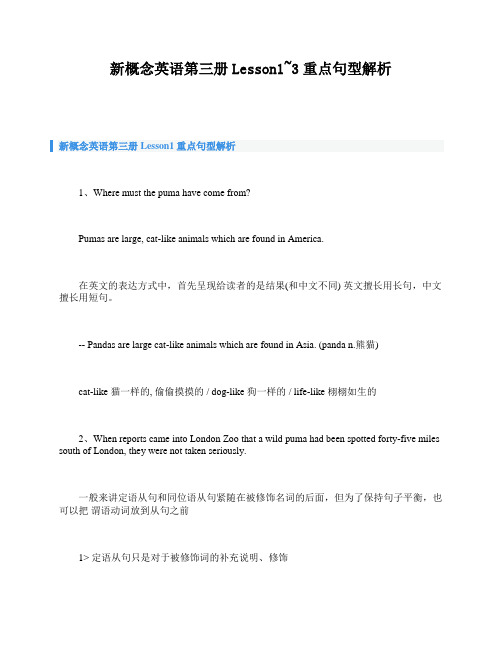
新概念英语第三册Lesson1~3重点句型解析新概念英语第三册Lesson1重点句型解析1、Where must the puma have come from?Pumas are large, cat-like animals which are found in America.在英文的表达方式中,首先呈现给读者的是结果(和中文不同) 英文擅长用长句,中文擅长用短句。
-- Pandas are large cat-like animals which are found in Asia. (panda n.熊猫)cat-like 猫一样的, 偷偷摸摸的 / dog-like 狗一样的 / life-like 栩栩如生的2、When reports came into London Zoo that a wild puma had been spotted forty-five miles south of London, they were not taken seriously.一般来讲定语从句和同位语从句紧随在被修饰名词的后面,但为了保持句子平衡,也可以把谓语动词放到从句之前1> 定语从句只是对于被修饰词的补充说明、修饰-- 定语从句的引导词:-- 指人:主语 who;宾语 who, whom;定语 whose-- 指物:that(也可以指人)/ which-- 时间状语:when / 地点状语:where / 原因状语:why2> 同位语从句则是讲述被修饰名词的内容-- 同位语从句的引导词:-- 名词(做主语、宾语等):关系词用 that 而不是 which-- 时间:when; 地点:where-- 定语从句中没有 what 这个关系词,但 what 可以引导同位语从句-- An idea came to her that she might do the experiment in another way. -- I have no idea what has happened to him。
新概念英语第三册第一课课件NCE3_lesson01(共20页)
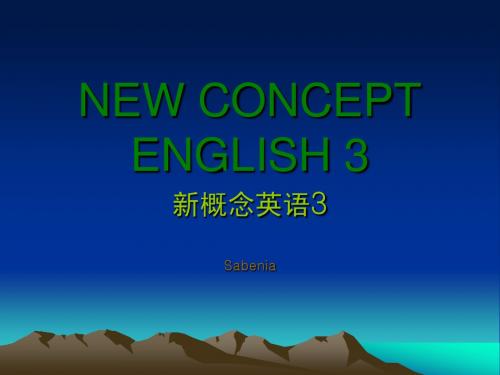
Retell the text
• Reports—London zoo–puma spotted—45 miles south of London • Similar in nature • Woman picking blackberries saw it first • Puma moved from place to place • Left trail of dead deer—small animals • Paw prints—puma fur found as well • ‘cats-like noises’—heard at night • Animal seen up a tree • Now experts convinced—really was a puma
• Reports—London zoo–puma spotted—45 miles south of London • Similar in nature • Woman picking blackberries saw it first • Puma moved from place to place • Left trail of dead deer—small animals • Paw prints—puma fur found as well • ‘cats-like noises’—heard at night • Animal seen up a tree • Now experts convinced—really was a puma
Assignments
• 熟读课文 • 默写单词 • 书后练习
第二课时
• 复习上节课内容 • 详解课文 • 完成书后练习
Dictation
• • • • • • • • • • • • • • • puma(title) n. spot v. evidence n. accumulate v. oblige v. hunt n. blackberry n. human being Corner v. trail n. print n. cling (clung,clung) v. convince v. somehow adv. Disturb v.
新概念英语第三册私人珍藏版Lesson 1 A puma at large 逃遁的美洲狮
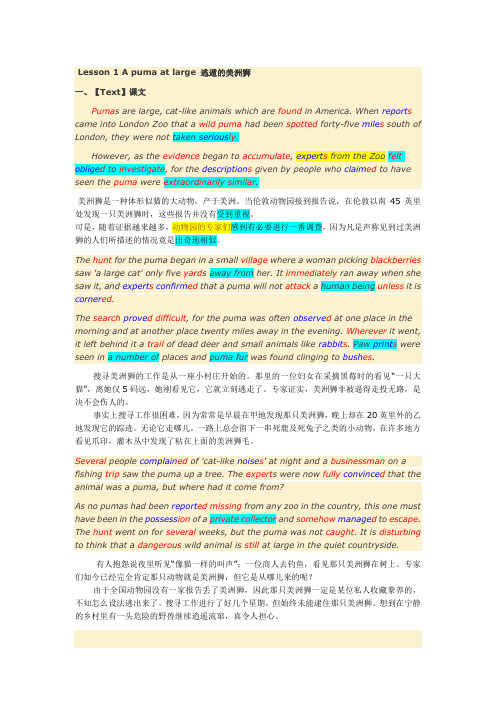
Lesson 1 A puma at large 逃遁的美洲狮一、【Text】课文Puma s are large, cat-like animals which are found in America. When report s came into London Zoo that a wild puma had been spotted forty-five mile s south of London, they were not taken serious ly.However, as the evidence began to accumulate, expert s from the Zoo felt oblige d to investigate, for the description s given by people who claim ed to have seen the puma were extraordinarily similar.美洲狮是一种体形似猫的大动物,产于美洲。
当伦敦动物园接到报告说,在伦敦以南45英里处发现一只美洲狮时,这些报告并没有受到重视。
可是,随着证据越来越多,动物园的专家们感到有必要进行一番调查,因为凡是声称见到过美洲狮的人们所描述的情况竟是出奇地相似。
The hunt for the puma began in a small village where a woman picking blackberries saw 'a large cat' only five yard s away from her. It immediately ran away when she saw it, and expert s confirm ed that a puma will not attack a human being unless it is corner ed.The search prove d difficult, for the puma was often observe d at one place in the morning and at another place twenty miles away in the evening. Wherever it went, it left behind it a trail of dead deer and small animals like rabbit s. Paw print s were seen in a number of places and puma fur was found clinging to bush es.搜寻美洲狮的工作是从一座小村庄开始的。
新概念英语第三册教案 Lesson1-2

Lesson 01 A Puma at large 逃遁的美洲狮Part One: New words and expression 生词和短语1、puma n.美洲狮a large cat-like animallion, tiger, leopard豹, jaguar美洲虎, cougar美洲豹, cheetah猎豹, lynx大山猫, panther黑豹2、spot v.看出, 发现 to see or find sth with difficulty不易察觉= see, pick out, recognize, catch sight of强调结果, 辨别出, 看见, 识别, 发现同意词:-- find:强调发现的结果/ find out:查出事实真相-- discover:做出重大发现/ notice:注意到-- observe:观察/ watch:观察活动中的人或画面observe: to see and notice sth(正式) 观察,观测discover: to find sth already in existencerecognize: to figure out sth/sb known alreadydetect: to disclose sth hidden or in disguise 探测explore: to examine sth thoroughly in order to test of find about it Internet ExplorerSpot 点,斑点a beauty spot, solar spot, -- There is a white spot on the shirt.spotlight, be in the spotlight Tom Cruse is in the spotlight in American film industry.A leopard will not change its spot. 江山易改,本性难移on the spot有两个含义:1> 立刻, 马上(at once, immediately)-- Anyone breaking the rules will be asked to leave on the spot.2> at the place of the action 在现场-- Wherever she is needed, she is quickly on the spot.3、Evidence n.证据(不可数名词)Evident adj.明显的, 显然的/ evidently adv.明显地, 显然Evidence = proof (n.证据)-- When the police arrived, he had already destroyed the evidence.in evidence 显而易见的-- He was in evidence at the party.witness 证人,judge法官,jury陪审团,court of law法庭self-evident a.不言自明的The Declaration of Independence: We hold these truths to be self-evident, that all men are created equal, that they are endowed by their Creator with certain unalienable rights, that among these are life, liberty and the pursuit of happiness. 我们认为以下事实是不言自明的:所有的人都是生而平等的,他们天生就被上帝赋予了不可剥夺的权利,人有生存的权利,获得自由的权利,追求幸福的权利。
新概念英语第三册第一课课件

★evidence
[u]n. 证据 When the police arrived, he had already destroyed the evidence. evidence=proof
evidence:显而易见的. He was in evidence at the party. evidently adv. evident adj.
Teaching Plan
30
lessons within 28 times of classes Take a roll each time A dictation for each lesson
彪 马
At large: (esp. of a dangerous person or animal) free;uncontrolled The two escaped criminals are still at large. 两个逃跑的罪犯仍然逍遥法外
corner
n.角落 at the corner of the street -- in the corner of the room -- on the corner of the desk
corner
trail
n. 一串,一系列
trail==follow
vt. 跟踪 eg: The police trailed the criminal to the place where he was hiding.
somehow
adv.不知怎么搞地, 不知
什么原因 = by some means, in some way, for some reason unknown -- I’ll get the book back somehow.
新概念三Lesson1-A-puma-at-large

oblige v. make somebody feel it is necessary to do something feel obliged to do sth. 感到有必要做某事 马英九觉得必须同大陆改善关系。 Mr. Ma Ying Jiu feels obliged to improve the relationship
with the mainland.
Be obliged to do sth 被强迫做某事 He was obliged to sell his car to pay his debts. 他被迫卖掉车去还债。
hunt n. 追猎;寻找 Hunter 猎人、猎犬 猎人尽最大努力去追捕这头美洲狮。
The hunter tried his best to hunt the puma.
+ 英文擅长用长句,中文擅长用短句。
+ cat-like 猫一样的, 偷偷摸摸的 / dog-like 狗一样的 / life-like 栩栩如生的
+ woman-like
+ 3. When reports came into London Zoo that a wild puma had been spotted forty-five miles south of London, they were not taken seriously.
trail n. 一串,一系列 汽车掀起了一股尘土。 The car raised a trail of dust.
convince v. make (someone) agree, understand, or realize the
新概念3册Lesson1-6 composition

Lesson 2 compositionA small village, the church clock suddenly stopped, no one could explain why.The vicar climbed into the clock tower, found that the clock had been invaded by bees, full of honey and wax.A bee keeper was called , removed the queen bee, the other bees followed, the clock was cleaned, clock working againA Sticky BusinessWe were used to hearing our church bell striking the hours in our small village. For as long as anyone could remember, the bell had struck the hours day and night. However, one night the church bell remained silent and the next morning we saw that the clock had stopped at exactly one a.m. Our clock was clearly damaged, but no one could explain how this had happened.Armed with a torch, our vicar climbed into the church tower to see what was going on. He heard a loud buzz as he went towards the clock and in the torchlight he found it had been invaded by bees. He was lucky they didn’t sting him! He shone his torch into the great bell and saw that it was full of wax and honey. No wonder it wasn’t working!A bee keeper was called in to deal with the situation. He immediately removed the queen bee to one of his bee hives and other bees followed. The clock was cleaned and was soon working again. We not only enjoyed hearing it strike the hours day and night, but we enjoyed eating the honey as well.Lesson 3After walking round the ancient city, the archaeologists …This temple…On entering the sacred room, the archaeologists… After this, workmen began digging and soon discovered… They also found … The archaeologists carefully… They were astonished to find that … The goddess was…She… Although the archaeologists … they were unable to find out her name.After walking round the ancient city, the archaeologists discovered an ancient temple. This temple had obviously been a place of worship because it contained a sacred room. On entering the sacred room, the archaeologists found clay fragments of fifteen statues, each of which was a goddess which had once been painted. After this, workmen began digging and soon discovered the head of a statue among remains dating from the fifth century B.C.. They also found the body of this statue among remains from the fifteenth century B.C. The archaeologists carefully put the fragments together. They were astonished to find that the figure was a goddess. The goddess was a very modern-looking women. She stood three feet and her hands rested on her hips and she was wearing a full-length skirt which swept the ground. Although the archaeologists tried very hard to identify her, they were unable to find out her name.Lesson 4Title: Nearly caughtIntroduction: Alf and three dustmen were collecting rubbish—arrived at Mrs. Frost’s house.Development:Alf’s wife was visiting Mrs. Frost at the time –Alf was just getting out of the dustcart – saw his wife leaving Mrs. Frost’s house – hid in dustcart –dustmen helped him – his wife talked to Mrs. Frost on the doorstep.Conclusion: The dustmen drove away just as Mrs. Bloggs came towards it.Nearly CaughtAlf used to be a dustman, but he was too embarrassed to say anything to his wife about his job. One morning, Alf and three dustmen were collecting rubbish in Merton Street and they stopped outside Mrs. Frost’s house.Though Alf didn’t know it, his wife was visiting Mrs. Frost at the time. She and Mrs. Frost were old friends, though Mrs. Frost had never met Alf. Alf was just getting out of the dustcart when he saw his wife leaving Mrs. Frost’s house. He quickly returned to the dustcart and hid in the driving cabin. While he was hiding, his fellow dustmen helped him by collecting Mrs. Frost’s rubbish. Meanwhile, Alf’s wife and Mrs. Frost talked on the doorstep. It looked as though their conversation would never end!At last Mrs. Bloggs said goodbye to Mrs. Frost. She waved to one of the dustmen whom she recognized and she went towards the dustcart to greet him. The dustmen waved back and gave her a big smile as the dustcart drove off. Mrs. Bloggs stood on the pavement and watched the dustcart disappear down the street. Then she began to walk home.‘It’s all right, Alf,’ his friend said. ‘She can’t see you now.’‘Thanks, Jim,’ Alf said. ‘That was a lucky escape!’Letter WritingDear Mrs. Frost,It was nice to meet you at Selena’s party last week.You mentioned you had a copy of Who’s Who. I am writing to ask if I could borrow if for a couple of days. I’m doing some research on politicians and this book contains a lot of information.I promise I will take care of it and return it to you as quickly as possible.I look forward to hearing from you soon.Yours sincerely,Signature:Lesson 5The journalist counted the number of steps as he he wearily climbed up to the high wall surrounding the president’s palace. On arriving outside the main gate, he sat down to get his breath back. He then produced a tape measure in order to measure the wall. While he was busy measuring the wall, a policeman approached him and asked him what he was doing. Though the journalist explained he was a reporter and his editor had asked him to find out the exact height of the wall, the policeman refused to believe him. He was arrested and sent to prison because the police thought that he might be a spy or might even want to assassinate the president. When the journalist insisted he was innocent, he made things worse for himself. This proved to the police that the man certainly was guilty and deserved to stay in prison indefinitely.Letter WritingDear Jack,Many congratulations on your recent marriage!Quite by chance I happened to read about your wedding in our local newspaper and I was thrilled with the news. Your wife sounds really charming. I gather that you will both be moving to our area, so we’ll soon be neighbours. I hope you’ll be very happy and I’ll be able to see you soon.I look forward to seeing you again and meeting your wife.。
新概念三Lesson 1 -A-puma-at-large(共34张PPT)
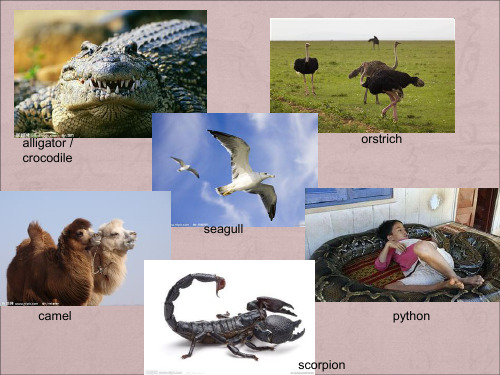
+ 5. It immediately ran away when she saw it, and experts confirmed that a puma will not attack a human being unless it is cornered.
+ Confirm = be sure = be certain (confirm vt.确定)
+ 英文表达方式习惯用被动语态, 突出客观事实。而 中文则善于运用动作的执行者。
+ 灌木丛中发现了粘在上面的美洲狮毛。 + Puma fur was found clinging to bushes. (被动) + We found the puma fur clinging to bushes. (主动) + Cling 是现在分词,作主语Puma fur的主语补足语。
with the mainland.
Be obliged to do sth 被强迫做某事 He was obliged to sell his car to pay his debts. 他被迫卖掉车去还债。
hunt n. 追猎;寻找 Hunter 猎人、猎犬 猎人尽最大努力去追捕这头美洲狮。
The hunter tried his best to hunt the puma.
+ 6. Wherever it went, it left behind it a trail of dead deer and small animals like rabbits.
+ 把某物留在后面:leave behind
+ 7. Paw prints were seen in a number of places and puma fur was found clinging to bushes.
新概念3 lesson1

1、accumulate vi. 累积;积聚vt. 积攒He tried to accumulate great wealth by hard work.Derivation: accumulation n.an accumulation of experience and knowledge2、investigate vt.调查They're still investigating the accident.Derivation: investigation n.investigator n.Investigative a.调查的eg.an investigative reporter3、oblige vt.强制,强迫;使负债务;使感激;施惠于vi.施恩惠;帮忙,效劳They were obliged to fulfill the signed contract.Collocation:oblige sb to do sthCircumstances had obliged him to sell the business.客观情况迫使他出售公司。
Derivation: obliged a.必须的;感激的;有责任的The storm got worse and worse. Finally, I was obliged to abandon the car and continue on foot.4、confirm vt. 确认;确定;证实;批准;使巩固To confirm my diagnosis I need to do some tests.为了证实我的诊断,我要做一些化验。
Derivation: confirmation n.eg.There has still been no official confirmation of the report.这则报道仍未得到官方证实。
新概念英语第三册课后习题答案详解

2... B
3... C
为…表示感谢:be grateful for…/ be thankful for…
不辞辛劳地做某事:take the trouble to do sth.
4... B in the past是过去时态的标志;always用在实意动词之前
-- They made her wait for hours.àShe was made to wait for hours.
5…答案正确:D
A)把say改成claim就对了(-- People claimed to have seen the puma.)
D)清楚的道明了动作发生的先后关系
6…正确答案:B
Lesson 01 A Puma at large
Special difficulties难点
Exercises A
1. at/for 2. to 3. to 4. in 5. on
Exercises B
1. He is the man we have heard about so much.
2. The shelf you put those books on has collapsed.(vi.倒塌,崩溃,瓦解)
at this distance of/in time时隔已久
-- I can hardly remember him at this distance of time.时隔这么久,我几乎想不起来他了。
原句中的when引导的时间状语从句表示:-...就…(as soon as)
被动:On being observed, it immediately ran away.
新概念英语第三册PPT课件:NCE3_lesson16(共33页)

III Text Study
Explain the text: She kept it tied to a tree in a field during the day and went to fetch it every evening. (1) Phrase: keep it tied 使它处于被绑着的状态 keep sth/sb adj./-ing/-ed 使…处于…状态 eg. This jacket will keep you warm. I’m sorry for keeping you waiting. I keep my windows closed at night. He keeps his dog locked in the kitchen when he is away. We’ll keep you informed of what happens.
I Warm up
Children’s Song: Mary had a little lamb Mary had a little lamb, little lamb, little lamb. Mary had a little lamb, its fleece(羊毛) was white as snow. And everywhere that Mary went, Mary went, Mary went. Everywhere that Mary went, the lamb was sure to go. It followed her to school one day, school one day, school one day. It followed her to school one day, that was against the rule. It made the children laugh and play, laugh and play, laugh and play. Why does the lamb love Mary so, Mary so, Mary so? Why does the lamb love Mary so? The eager children cry. Why, Mary loves the lamb, you know lamb, you know, lamb, you know. Mary loves the lamb, you know, the teacher did reply.
新概念 lesson1-3

● C. as
● D. where
LESSON 1 WORKBOOK
● as
● I love you more and more each day as time
goes by.
● “随着”或“一边,一边”
● 时间状语从句
● 强调主从句动作同时发生或变化
LESSON 1 WORKBOOK
● as
● as far as ● as far as I know… ● as well as ● 直到…为止,像什么一样远
● 据我所知…
● 又,也
● Hatred is blind as well as love.
LESSON 1 WORKBOOK
● 5. ______ no tiger was reported missing, it was
LESSON 1 WORKBOOK
● I was halfway back to the cottage where my mother
lived ____ Susan caught up with me.[CET4]
● A. though
● B. until
● C. when
● D. while
to do sth
to have done sth.
LESSON 1 EXERCISES
● 7. Pumas never attack a human being except
_____ cornered. (I.9)
● A. they are
● B. being
a puma will not attack a human
● 顺便拜访
● 调查,观察
● 无视某人,快速检查/阅读
新概念3课件Lesson1

puma or not?
• 美洲狮是一种体形似猫的大动物,产于美洲。当伦敦动物 园接到报告说,在伦敦以南45英里处发现一只美洲狮时, 这些报告并没有受到重视。可是,随着证据越来越多,动 物园的专家们感到有必要进行一番调查,因为凡是声称见 到过美洲狮的人们所描述的情况竟是出奇地相似。
• 搜寻美洲狮的工作是从一座小村庄开始的。那里的一位 妇女在采摘黑莓时的看见“一只大猫”,离她仅5码远, 她刚看见它,它就立刻逃走了。专家证实,美洲狮非被逼 得走投无路,是决不会伤人的。事实上搜寻工作很困难, 因为常常是早晨在甲地发现那只美洲狮,晚上却在20英里 外的乙地发现它的踪迹。无论它走哪儿,一路上总会留下 一串死鹿及死兔子之类的小动物,在许多地方看见爪印, 灌木丛中发现了粘在上面的美洲狮毛。有人抱怨说夜里听 见“像猫一样的叫声”;一位商人去钓鱼,看见那只美洲 狮在树上。专家们如今已经完全肯定那只动物就是美洲狮, 但它是从哪儿来的呢?由于全国动物园没有一家报告丢了 美洲狮,因此那只美洲狮一定是某位私人收藏豢养的,不 知怎么设法逃出来了。搜寻工作进行了好几个星期,但始 终未能逮住那只美洲狮。想到在宁静的乡村里有一头危险 的野兽继续逍遥流窜,真令人担心。
• Assemble • v.集合, 集会 / 装配
新概念英语第三册课文重点精讲解析Lesson1~3

【导语】新概念系列教材的经典早已不⾔⽽喻。
其⽂章短⼩精悍,语句幽默诙谐,语法全⾯系统,历来被公认为是适合⼤多数中学⽣课外学习的资料之⼀。
为您整理了以下内容,仅供参考。
希望可以帮助到您!如果您想要了解更多相关内容,欢迎关注!新概念英语第三册课⽂重点精讲解析Lesson1 at large:逃遁的,没有被控制的 详细地(in detail) 总体来讲(as a whole) 在英⽂的表达⽅式中,⾸先呈现给读者的是结果 写议论⽂的时候要注意把握观点 Pandas are large cat-like animals which are found in Asia. life-like: 栩栩如⽣的 ⼀般来讲定语从句和同位语从句紧随在被修缮名词后⾯,但为了保持句⼦平衡,也可以把谓语动词放到从句之前 定语从句只是对于被修缮词的补充说明、修缮; 同位语从句则是讲述被修饰名词的内容 定语从句的引导词: 指⼈:主语who; 宾语who/whom; 定语 whose 表达事物:that(也可以指⼈)/which 时间状语:when; 地点状语:where; 原因状语:why 同位语从句:名词做主语、宾语等,关系词⽤that⽽不是which 时间-when; 地点-where An idea came to her that she might do the experiment in another way. I have no idea what has happened to him。
定语从句中没有what这个关系词,但它可以引导同位语从句 take sth.seriously :deal with sth.seriously take sth.lightly as: 随着 过去分词做定语 声称曾经做过某事:claim to have done sth. I still remember the school where I studied English. confirm: be sure,be certain search=hunt 把某物留在后⾯:leave behind 英⽂的表达⽅式重点在于突出客观事实,⽽中⽂则善于运⽤动作的执⾏者 complain of /about 抱怨 on + 名词:强调动作正在进⾏ on the rise :在上升 on the increase: 在增加 on the watch: 在观看 on the match: 在⽐赛中 on the fishing trip: 在钓鱼的途中 on holiday: 在度假 fully: completely,entirely in the possession of sb.=in sb.'s possession 归某⼈所有 in possession of sth. 拥有某物 take possession of 拥有 The beautiful car is in my possession/in the possession of me I am in possession of the beautiful car The person in possession of the big house is excited. It is disturbing to think that... 熟读并背诵第⼀⾃然段 at large take something seriously cling to leave behind complain of in the possession of/in possession of feel obliged to investigate a woman picking blackberries a businessman on fishing trip go on for several weeks in the quiet countryside新概念英语第三册课⽂重点精讲解析Lesson2 现在进⾏时和always等频度副词的搭配——表⽰说话⼈带有的情感⾊彩 Tome is always doing homework. Tom always does his homework. He is always making noises. one or another: 表⽰某种,这样或那样 I have to get enough money to have my house repaired have the church clock repaired——have something done 找某⼈来做某事 have the plane repaired have hair cut 某⼈所遭受到的意外某种情况——主语必须是发出动作的⼈ His wallet was stolen. He had his wallet stolen. used to:过去常常做,⽽现在不再发⽣的事情了 He used to smoke every day. however——⽤于⼝语,主要⽤于句⾸,作⽂中,⽤在句中、句尾,要⽤逗号分隔开来 He said that it was so,he was mistaken,however He said that it was so,however,he was mistaken. I know his story,however,I wouldn't like to tell you. I know his story,I,however,wouldn't like to tell you nevertheless nonetheless start: 惊跳,惊奇 before:...才 Armed with a torch... 现在分词和过去分词的⽤法 looking 分词做状语/定语的时候,⼀定要注意它和逻辑主语要呼应⼀致 in the torchlight ⾮正式⽤语中whom可以省略掉 recognized somebody as: 认出某⼈是 regard somebody as,think of somebody as,treat somebody as,have on somebody as whatever: ever⽤来加强语⽓ night after night: ⼀夜连着⼀夜 day after day year after year week after week bus after bus did 肯定句中常⽤do,did,does加强语⽓和情感⾊彩,⼀定要位于动词原形之前as well ⽤在句尾相当于to,主要⽤于肯定句中,但⽐to所表达的语意更优秀 stil⽤于句⾸,⽤逗号分隔开来——表达⼀个转折的关系:虽然如此,但是get used to,be used to,be accustomed to,get accustomed to 都表⽰习惯于 get强调渐近的过程, be强调习惯了的状态。
新概念英语lesson 1 2 3

龙文教育学科老师个性化教案教师学生姓名上课日期学科英语年级八年级教材版本人教版学案主题课时数量(全程或具体时间)第( 1 )课时授课时段教学目标教学内容个性化学习问题解决教学重点、难点教学过程一.Self-introduction二.Lesson one1.背景知识西方人很重视自己的私人空间,最不喜欢别人干涉他人的私人生活,比如问他们的收入、打听他们的家庭情况等等。
不喜欢别人的听他的私事,还有他们不喜欢没有感恩心的人,他们觉得连感恩都不会的人,不值得深交,所以跟西方人交往要注重自己的行为举止。
1/4的西方人忌讳“13”,要“13日”再加上“星期五”是最“险恶”的日子,其由来要追溯到远古。
这一忌讳源于很多传说:其一,传说耶稣受害前和弟子们共进了一次晚餐。
参加晚餐的第13个人是耶酥的弟子犹太。
就是这个犹大为了30块银元,把耶稣出卖给犹太教当局,致使耶稣受尽折磨。
参加最后晚餐的是13个人,晚餐的日期恰逢13日,“13”给耶稣带来苦难和不幸。
从此,“13”被认为是不幸的象征。
“13”是背叛和出卖的同义词。
这类的传说很多、很广,特别是关于《最后的晚餐》的传说,在西方已经深人人心,达·芬奇还画了名画《最后的晚餐》,流传甚广。
因此“13”成了西方世界最为忌讳的数字。
2.课文详解A private conversation私人谈话private强调是个人隐私的,私密的,是你不愿公开透露让过多人知道的personal强调是个人的,与隐私不一定有关,只是与你个人有关的Why did the writer complain to the people behind him?complainvi. 抱怨,发牢骚;诉说(病痛等)[(+to/about)]He complained to me about the food.他向我抱怨伙食不佳。
vt.抱怨;控诉[+that]He complained that the exam was too hard.他抱怨考试太难了。
- 1、下载文档前请自行甄别文档内容的完整性,平台不提供额外的编辑、内容补充、找答案等附加服务。
- 2、"仅部分预览"的文档,不可在线预览部分如存在完整性等问题,可反馈申请退款(可完整预览的文档不适用该条件!)。
- 3、如文档侵犯您的权益,请联系客服反馈,我们会尽快为您处理(人工客服工作时间:9:00-18:30)。
somehow
• somehow不知怎么样的 Somehow, she fainted to the ground • Somewhat 有点 I felt somewhat uneasy in front of the strangers. • Anyway 无论怎样反正 It doesn’t make much difference, because we are going to be late anyway. Anyway, 可用于叙述中改变话题,可与anyhow互换 Well, anyhow/anyway, shall we go on the next point now? 好吧,现在我们谈谈下一要点
• Descriptions given by people(被动) • Woman picking blackberries(主动) 都由定从演变而来 • Descriptions which were given by people • Woman who picked blackberries 为什么要改?
disturb
• • • • • Turb- 搅动 Perturb v 是心烦意乱 (L39) Turbulence 动乱、骚动 Turbid 浑浊不清的 Disturbing 令人不安的
比较同义词:令人心烦意乱的 • Distress:to make sb. unhappy and worried It distresses me that she has left home like this. ……是我很难受 • agitate: cause anxiety to The news agitated him; he kept pacing the room. 消息令他不安,来回踱步 disturb 程度小于agitate
accumulate
• Accumulate:任何事物(长期地)积累 • Amass(59):尤指对金钱、珠宝等有价值东风 的大量积累 • ~ experience • ~ ill will against sb.(憎恶情绪) • Dust soon ~s in rooms that are not cleaned. • The poetry ~s meaning every time it is read. 真正的好诗人们每读一遍就会有新的含义
at large: • 贬:指危险的人或动物,逍遥在外 2 of the escaped prisoners are at large. • 中:自由,不受约束 班主任离开了,学生自由了: students are at large • 整个,全部: there has been unrest in the country at large. 国内到处都有骚乱
oblige
• 常用被动 : • Feel /be obliged to do sth. 觉得有义务做 某事,不得不做。 • Be compelled to=be forced to =be obliged to • Since the exam is around the corner , we feel compelled to give up sports.
• The news got around that a variety show would be presented at our local cinema by the P. and U. Bird Seed Company.(新 二 L89) • Lesson 1
高考真题
• 2006 安徽 29 • A warm thought suddenly came to me ___ I might use my pocket money to buy some flowers for my mother’s birthday. • A if B when C that D which
vocabulary
• Spot: 动词、名词,意思都和“点”有关系。 • V. He spotted his friend in the crowd. • N. 现场、斑点 The leopard can’t change his spots. 江山易改,本性难移 Spotty 皮肤有斑点的 a spotty face/ a spotty dog Spotless:洁白无暇的;诚实的 =immaculate 清洁的,没有污点的 L49
evidence
• [U]: a critical piece of evidence • vt 证明,表明 参加游泳的学生不断增加,这就证明 学校内体育受欢迎。 The popularity of sport on campus can be evidenced by the growing numbers of students taking part in swimming.
• 3 As is known to all/As is common knowledge, Prof. Wang is tied to a schedule that leaves little time for personal life. (as 插入语,常用不完整句式)
• 4 本篇课文 • As 引导原因状语从句,包括下文: • As no puma had been reported missing from any zoo in the country, this one must have been in the possession of a private collector… 15
• Take sth. Seriously = deal with sth. Seriously • Take sth. Lightly 对某事草率处理 He was startled at the story being taken seriously. 这个传闻被当做真的,他感到很吃惊。
as 四大经典用法
课文精讲
• Cat-like 无限替换:childlike (childish) / womanlike / ghost-like / petal-like/ man-like
课文精讲
• 同位语从句(04-08):高考共 9次出现 9/53 • 高度提炼,再讲从句 • 名词性从句: 从句充当名词 主、宾、表、同位 The book is interesting. I love the book My present is a book Mary, a beautiful girl, loves reading books.
• 1 Just as the earth circles around the sun, so the moon revolved around the earth. (just as… so 引导方式状语) • 2 Steve taught himself to play the piano as quickly as he had once learned the harmonica. (as 引onvince sb. of sth. • I convinced him of my honesty • He was convinced to withdraw his candidacy. 退出竞选 • vinc-,vict 征服 victor, victory, vanquish (征服) invincible(难以征服的,无敌的)
高考真题
• 07 江苏 6 • The question that __ the earth is round is discussed. • 用whether,而非 if
• 定从与同位语的核心区别 • The fact that the earth is round is from him. • The fact that I know is from him.
About New Concept
Classic Comprehensive
: 词 、句、 思维、 文化
A puma at large
逃遁的美洲狮
• Puma 美洲狮 • Leopard 美洲豹 • Jaguar 美洲虎
puma
山寨---puma
leopard
jaguar
Title Analysis
A. 从句的种类 1. 名词性从句: ① ② ③ ④ 2. 定语从句 3. 状语从句 主语从句 宾语从句 表语从句 同位语从句
名词性从句的功能
1 That the earth is round is true. (主语) 2 I know that he no longer loves you? (宾语) 3 My opinion is that you should not go there alone. (表语) 4 The fact that the earth is round is true. (同位语) 5 I don’t like the idea that money is everything.
同位语从句
• 一般由that引导,也可以由wh-引导, 做进一步说明。 • 常接名词有: news, fact, story, problem, order, question, evidence, suggestion, proposal…
• The king’s decision that the prisoner would be set free surprised all the people. • The order that all soldiers should stay still is given by the general. • The question when he will resign is yet to be decided.
• 同位语从句在句中的位置 • 一般紧跟所修饰名词,有时被别的词 隔开 • He got the news that the sports meeting was put off. • He got the news from Mary that the sports meeting was put off.
